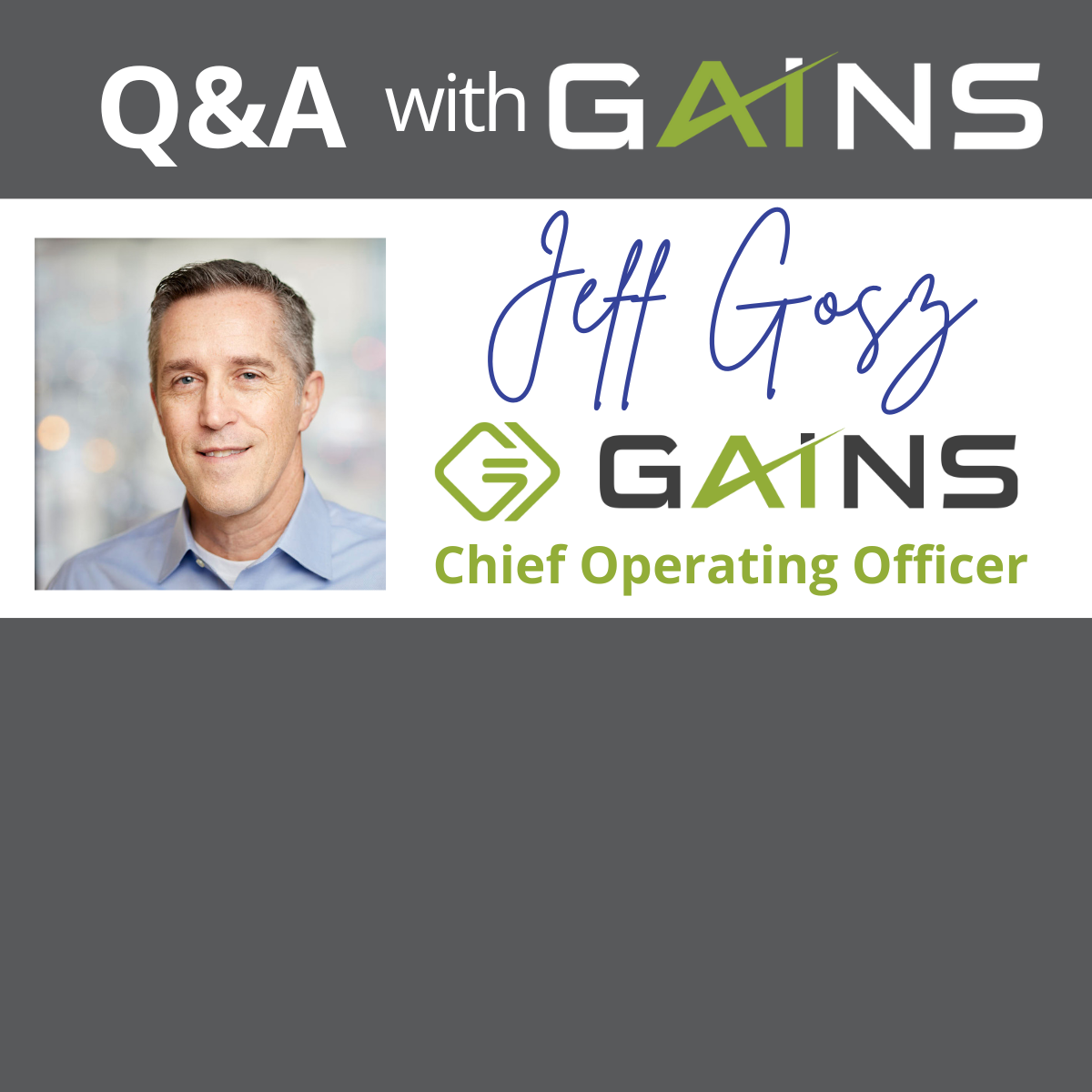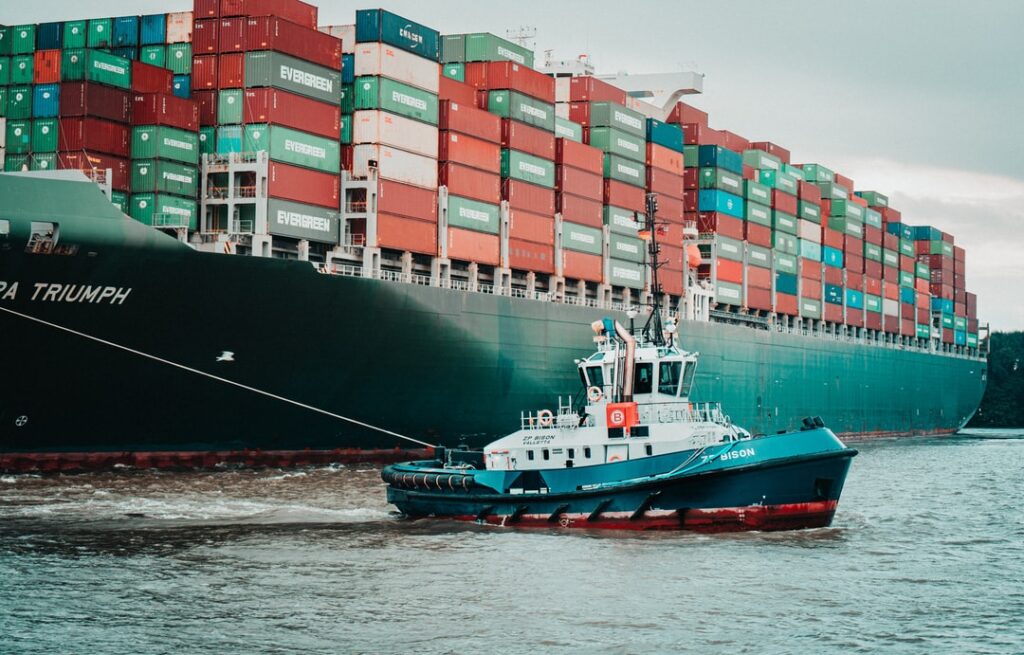Jeff Gosz is the Chief Operating Officer at GAINS and a long-time veteran in the supply chain industry. With a wealth of experience leading GAINS’ Professional Services team, Jeff’s insights are invaluable for understanding supply chain management’s current and future landscape. We sat down with Jeff to discuss his perspectives on significant industry changes, the impact of recent challenges, and strategies for building supply chain resilience.
Question 1: What have been some of the most significant changes in supply chain planning over the past few years, and how have you helped companies navigate them?
Over the past few years, one of the most significant changes in supply chain planning has been increased volatility and complexity. Disruptions due to global events like the COVID-19 pandemic, political tensions worldwide, and natural disasters have made supply chain planning more challenging. Recognizing that we now live in a VUCA era, these disruptions impact transportation, supply, demand, and others and are persistent year in and year out.
My key takeaway is that we need to plan for these disruptions and not be surprised. Companies should balance their people, processes, and technology to align with their business goals and current maturity in their supply chain journey. At GAINS, we help companies build resilient and agile supply chains by coupling advanced technologies such as AI and machine learning with battle-tested planning capabilities to improve planning and decision-making, enhance visibility across the supply chain, and foster a culture of continuous improvement. Additionally, having a robust risk management strategy that includes scenario planning and developing contingency plans is crucial to mitigate the impact of disruptions.
Question 2: How have your experiences changed your perspective on today’s supply chain challenges?
My background in engineering and finance has significantly shaped my perspective.
As an engineer, I learned the importance of setting up robust models for analyzing a structure or managing a supply chain. This process involves applying and understanding fundamental principles to ensure the model’s effectiveness. Just as in engineering, where reliable models are crucial for the longevity and safety of structures, accurate models are essential for efficiency and resilience in supply chain planning.
In engineering, key structural model details such as loads, material properties, and boundary conditions contribute to the integrity and performance of the final structure. Similarly, in supply chain management, factors such as demand plans, inventory parameters, and supplier constraints must be carefully modeled to ensure smooth operations. Any oversight or error in these models can lead to significant issues, whether a structural failure or a disruption in the supply chain.
From a financial perspective, managing inventory is like managing an investment portfolio. You must have a robust process and system rather than relying on intuition. In finance, you assess risks, allocate resources wisely, and plan for various market conditions. The same principles apply to supply chain planning, where you must account for volatility and uncertainty while ensuring your process can handle unexpected challenges. This understanding has reinforced the importance of having and trusting a solid process, even when faced with complexity and ambiguity. By combining these fundamental engineering and financial principles, we can create more resilient and adaptable supply chains capable of withstanding the complexities and disruptions of today’s global market.
Question 3: Is there anything that still surprises you about the supply chain industry?
It’s surprising how few people recognize supply chain as a proper discipline with many different facets.
One thing that still surprises me is how few people recognize supply chain as a proper discipline with many facets. People often lump logistics, planning, and design into one amorphous blob, but each area is highly specialized and complex. This lack of recognition underscores the importance of specialized knowledge in these areas, which is becoming increasingly critical. While the awareness brought about by the pandemic has helped, there is still a long way to go.
It also surprises me how some companies continue to rely on outdated practices like spreadsheets and broad-brush policies despite the availability of modern tools and technology. This slow pace of digital adoption is unexpected, especially given the proven benefits of the technology.
On the positive side, I am often inspired by the innovative solutions that companies develop in response to complex supply chain challenges. The creativity and ingenuity displayed by supply chain professionals, often under significant constraints, continue to impress me. The rapid pace at which new technologies are being developed and implemented, such as AI, process automation, and IoT, highlights a few ways the supply chain industry continues to evolve.
Question 4: What current market trends are you most excited about?
I am most excited by the rate of innovation, especially in areas like AI, machine learning, and advanced computing power.
Adopting these technologies and the openness to innovation we see and hear when speaking to new customers and even some we’ve worked with for a while, like Border States, are truly exciting. The landscape is constantly evolving, and there’s always something new around the corner. Diving in and being part of these changes is essential; finding the perfect time to start an improvement project is nearly impossible. You risk being left behind if you don’t embrace these innovations as soon as possible.
Beyond theoretical concepts, supply chain leaders are actively implementing and revolutionizing their companies’ supply chain operations. Using AI and ML to analyze vast amounts of data in real-time and make intelligent decisions is transforming the industry. This shift towards a more data-driven approach enables companies to predict demand more accurately, optimize inventory levels, and enhance overall efficiency.
The pace of technological change means that companies must remain agile and willing to adopt new tools and methodologies. There is never a perfect time to implement these technologies; it’s about continuously evolving and integrating them into everyday operations. Supply chain solutions like GAINS, which embrace this composable, move-forward, faster mindset, will stay ahead of the curve and leverage innovations to drive competitive advantage. The openness to innovation and the willingness to experiment with new technologies define the future leaders in the supply chain industry, as they will be better equipped to handle uncertainties and capitalize on new opportunities.
Question 5: What should supply chain executives focus on in 2024 to enhance resiliency?
To build resiliency in 2024, supply chain executives should focus on balancing people, processes, and technology.
All three are critical and must be integrated effectively to navigate the complexities of modern supply chain planning. This balance provides the necessary resilience to handle various challenges and disruptions.
Executives should also foster a culture of innovation, encouraging new ideas and approaches to stay ahead of the curve. Embracing digital technologies like AI and advanced analytics can enhance visibility and decision-making, allowing for real-time responses to disruptions. Developing comprehensive risk management strategies and building solid supplier relationships are also essential. These steps ensure better collaboration and communication during crises, leading to more resilient supply chain operations.
In conclusion
As we look forward to the future of supply chains, Jeff Gosz’s insights highlight the importance of strategic planning, technological adoption, and collaboration in building resilient supply chains. In a (VUCA) world of constant change, the ability to innovate and adapt will set successful supply chain operations apart from their competitors. Jeff emphasizes that the balance of people, processes, and technology is crucial for creating a robust and agile supply chain capable of withstanding various challenges and disruptions.
Fostering a culture of innovation, embracing digital technologies like AI and advanced analytics, and developing comprehensive risk management strategies are essential steps for future-proofing supply chains. Jeff’s contributions to the field as part of GAINS underscore supply chain management’s dynamic and integral role in driving business success in an increasingly complex and interconnected (VUCA) global market.
Are you interested in a conversation?
More from GAINS:
Blog: How GAINS Embodies ASCM’s Supply Chain Vision for 2024
Blog: 7 Common MRO Supply Chain Challenges And How To Overcome Them



